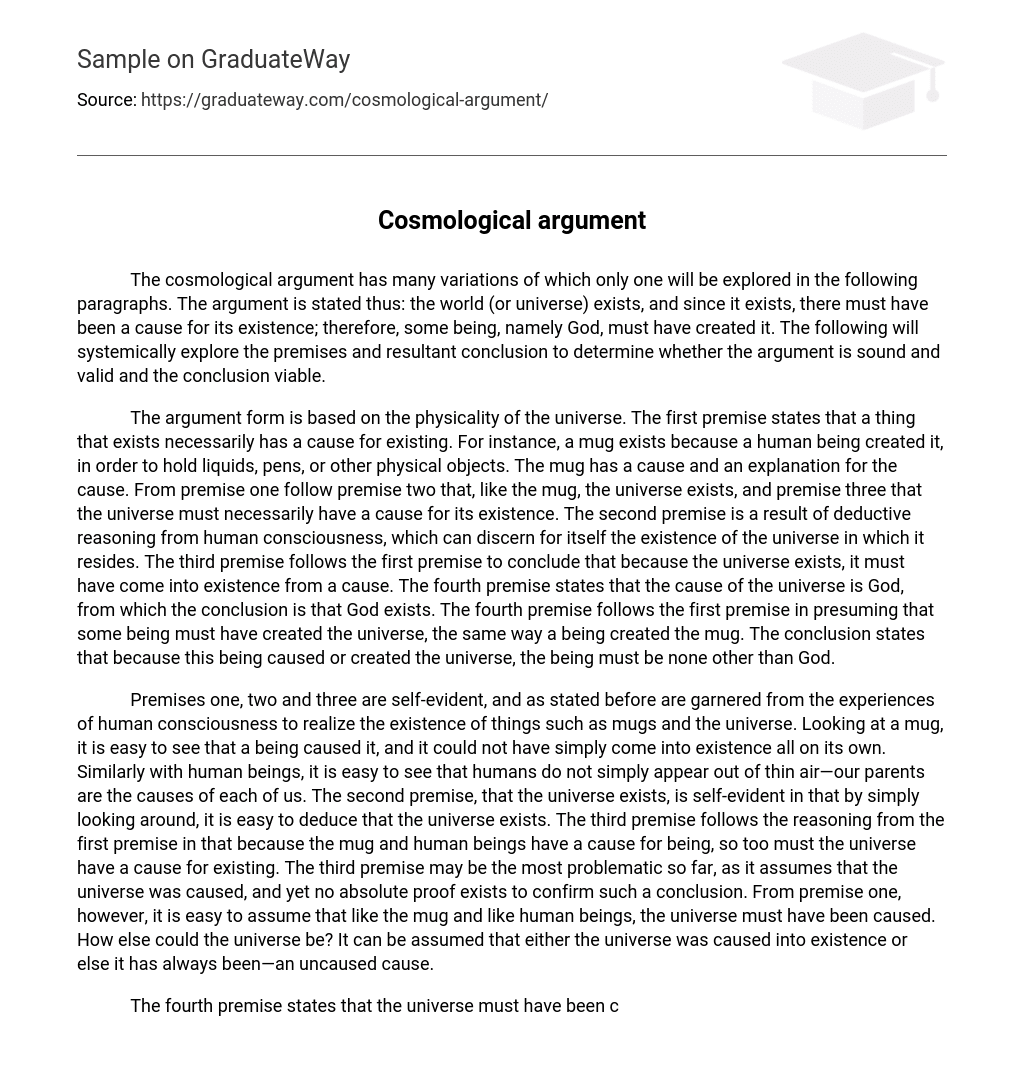The cosmological argument has many variations of which only one will be explored in the following paragraphs. The argument is stated thus: the world (or universe) exists, and since it exists, there must have been a cause for its existence; therefore, some being, namely God, must have created it. The following will systemically explore the premises and resultant conclusion to determine whether the argument is sound and valid and the conclusion viable.
The argument form is based on the physicality of the universe. The first premise states that a thing that exists necessarily has a cause for existing. For instance, a mug exists because a human being created it, in order to hold liquids, pens, or other physical objects. The mug has a cause and an explanation for the cause. From premise one follow premise two that, like the mug, the universe exists, and premise three that the universe must necessarily have a cause for its existence. The second premise is a result of deductive reasoning from human consciousness, which can discern for itself the existence of the universe in which it resides. The third premise follows the first premise to conclude that because the universe exists, it must have come into existence from a cause. The fourth premise states that the cause of the universe is God, from which the conclusion is that God exists. The fourth premise follows the first premise in presuming that some being must have created the universe, the same way a being created the mug. The conclusion states that because this being caused or created the universe, the being must be none other than God.
Premises one, two and three are self-evident, and as stated before are garnered from the experiences of human consciousness to realize the existence of things such as mugs and the universe. Looking at a mug, it is easy to see that a being caused it, and it could not have simply come into existence all on its own. Similarly with human beings, it is easy to see that humans do not simply appear out of thin air—our parents are the causes of each of us. The second premise, that the universe exists, is self-evident in that by simply looking around, it is easy to deduce that the universe exists. The third premise follows the reasoning from the first premise in that because the mug and human beings have a cause for being, so too must the universe have a cause for existing. The third premise may be the most problematic so far, as it assumes that the universe was caused, and yet no absolute proof exists to confirm such a conclusion. From premise one, however, it is easy to assume that like the mug and like human beings, the universe must have been caused. How else could the universe be? It can be assumed that either the universe was caused into existence or else it has always been—an uncaused cause.
The fourth premise states that the universe must have been caused, and that the cause is God or some personal, divine being. After the third premise, the fourth is the most problematic in the argument. There is no reason to attribute the cause to some divine being. The cause may very well have been a mixture of chemicals exploding at just the right temperature at just the right time to form the universe today. The cause could have been any number of causes, and to attribute it to a being like God is jumping to conclusions. However, if the cause is not God, then what is the cause? Because the answer remains uncertain, this premise, like premise three, can be assumed to be true insofar as no other proofs are available.
The conclusion from premise four stating that because the cause of the universe is God, God must exist can be explained by the notion of infinite regress. If there is a cause to everything, where do the causes cease? The causes can go to infinity, and it would never be resolved what the first cause is. Therefore, there must be a first cause, an uncaused cause. The uncaused cause can only be a being such as God.
If all the premises are true, the conclusion should also be true. However, the premises are debatable, and therefore the conclusion itself is debatable. As previously stated, the first three premises are self-evident, gleaned from deductive reasoning. It is the fourth premise that the debate begins, as it assumes that the cause must be God, and it denies the possibilities of other causes that do not necessarily have to be such a being. The conclusion, then, is at best a speculative one, as there is no absolute proof that the primary cause is even a being; there can only be speculation regarding the first cause.





